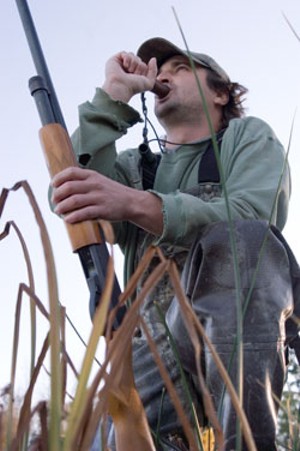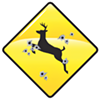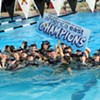Published November 7, 2007 at 5:13 p.m.
The writers, editors, sales people, web heads, graphic designers and general office-folk at Seven Days are a smart group of people. Several speak two languages — some three — and most have hip side projects outside of work. In their free time, a Seven Days-er might be the owner of an indie record label, a promoter for a mixed-martial-arts fight night, or the lead singer of a local rock band. But seasoned sportsmen? I don’t think so.
They have this nifty way of trimming syllables from words that makes the word, and the speaker, seem so much cooler. What I’ve always known as credibility becomes “cred,” which, when said, gives the speaker more of it. Attitude is simply “’tude,” which sounds much more snotty — and appropriate.
When I became one of them about three months ago, I had very little cred in the world of alt weeklies, but a healthy dose of ’tude to go around. I speak one language. You are reading it. My chances of singing for a rock band: nil. (For the record, I was kicked out of junior high chorus.) True, I do have my own repertoire of whittled words. Take “pritnear,” for example. It means “close to” or “pretty near.” Clever, eh? As far as side projects — outside of going out to eat, drinking beer and smoking cigarettes — I hunt and fish.
In some circles, my passions are natural — almost expected. In others, such as the liberal stronghold of Burlington, not so much. And with Seven Days viewed by many Vermonters as the Left’s munificent mother ship, keeping my passions to myself seemed like the way to go.
It doesn’t turn out that way, though. When I mention to a coworker that I plan to spend the weekend in the marsh looking for ducks, her interest is a pleasant surprise. Once word gets out, everyone in the office has something to say, and we eventually agree to pour some ink into the issue. But it quickly becomes apparent I’m the only one with any experience in the field. As one editor puts it: “You can be our office redneck.” Finally, a groovy side project.
**************
For some, hunting has turned into a repugnant display of pseudo-manliness. To many, it means guns, killing, aggression and a lack of compassion and respect for wildlife. The extreme anti-hunting crowd pictures Ted Nugent in a loincloth tramping through the woods — a bazooka fixed on anything that moves, a guitar slung over one shoulder, “Cat Scratch Fever” playing in the background.
Meanwhile, on the other side, Constitution thumpers hold hunting high as a beacon of American pride that sets us apart from the weak, and shows our strength and tolerance. To them, its opponents are tree-hugging longhairs. They’re quick to cite Nugent’s credo, “You’ve got to kill it to grill it” — but also a litany of ways sportsmen fund wildlife conservation efforts nationwide.
My reality is somewhere in between. Taking to the field, whether for deer, ducks, turkey or other small game, puts you in touch with humanity on some of its most basic levels. It’s an education with no formal degrees, one that generally starts when you’re young, and never ends.
I must have been 8 or 9 years old when my father bought me my first Daisy BB gun. Just holding it made me feel trusted, and more grown-up. Initially, I’d come home from school and spend the evening after dinner in our cellar. Lying prone, plugging a cardboard box with mini-musket balls, I talked to myself and imagined a real hunt. I learned how to exhale and hold it, to steady a shot. I learned to respect the business end of a gun. I learned how to be alone.
Daisies in hand, a friend and I would spend entire days on his family’s dairy farm. As we struck out in the morning, often in full camouflage and black face paint, the creeks and ponds opened up a new world to me. It was always there, crouching and silent. But I needed to listen for it to come alive.
I witnessed the grace of bounding deer, the speed and backwards dart of crawfish, the song of migrating birds, and the crafty silence of a weary turkey. I watched sportsmen bring them home after successful hunts, in awe of the ability to understand and capture these creatures. I sat around the dinner table and heard tales of their demise. I listened to all this, and learned.
Once the fiery flash of fall begins to smolder in the New England woods, a primal pilot light flares somewhere in my soul. This urge, I believe, is as natural as life itself. It can be difficult to explain, but it has its purpose. There was a time when we all depended on it, and warmed our hands by its flames. For me, it cannot be denied.
*************
I contact Kyle Scanlon, editor of the Colchester-based Outdoors Magazine, to ask him where I can find a good hunting party, in hopes a fellow publico and sports enthusiast will want to take part in Seven Days’ first-ever hunting issue. He seems more than happy to oblige. We meet before dawn at a Colchester Maplefields. Due to a Friday night Halloween party, I oversleep and show up a half-hour late — a huge no-no in the hunting world — but he doesn’t appear to hold it against me.
I park my truck and jump in the front seat of Kyle’s pickup. With a thick layer of dust on the dash and plenty of dirt on the floor, it makes me feel right at home. I jam my hunting bag — chock-full of steel shot, duck calls and beef jerky — between the two of us and stuff my heavily layered self into the remaining space. My weapon of choice — a 12-gauge pump-action Remington model 870, affectionately known as “The Bill Collector” — is cradled in my left palm.
I can see Kyle is unsure about me. It may be the Elvis sideburns, which were a hit at a party the night before. (They’re the big, lamb-chop kind, too. The ones from the late Vegas years.) I can’t blame him for wondering if he’s made the right decision. After all, he’ll be spending the day in the woods with a total stranger who’s packing heat. I should have shaved.
It’s still dark when we get to our destination. We make our way into the woods and into knee-high marsh muck. The walking isn’t easy. Reeds reach above our heads and tangle with our arms, guns and legs. After several breathers, we reach our pothole. It’s barely light by the time we get there, and Kyle spots some Canadian geese wallowing about 50 yards out. I try to stalk slowly, but have no chance of staying quiet in these tall reeds. I am out of my element and the birds know it. They honk and fly away.
Kyle and I set up a dozen foam decoys in the thigh-deep water and muck that fills our pothole. We find a relatively dry hump of mud and take a knee. I pull three shells from my fanny pack and load up.
Hunkered down in the marsh, Kyle and I get to know each other. We start with hunting and go from there. I tell him how I mostly hunt the southernmost portions of Lake Champlain, and only got serious about duck hunting after meeting my girlfriend, whose father showed me some of the best bird hunting I’ve ever seen. Kyle tells me how he and his father used to hunt this very marsh. His oldest daughter is finally getting to an age where she’s interested in going with him. I think of my son, who’s not quite 2 years old, but who had honked his first duck call only days before.
I think of the countless mornings spent in the marsh, listening to the gentle banter among the hundreds of birds sitting unseen in a sea of cattails, and how I use my calls to take part in their ancient conversations. Listening closely teaches you that an effective duck call comes from the diaphragm. It musters deep inside and takes years to master, but when you finally learn to talk to birds, it’s obvious they love to chat.
As Kyle and I kneel in the gray morning drizzle with eyes fixed on the sky, a few birds circle overhead. They crook their skinny necks our way before opting for a nearby pothole. “What don’t they like about this?” Kyle wonders. So do I.
A couple hours tick by without any shooting. My thoughts wander to my belly. Kyle mentions wrapping duck breast in bacon and cooking it on the grill. That’s enough for me. It’s time to go. “Well, at least you’re normal,” Kyle says as we exit the marsh. He admits he was surprised to be contacted by “someone from Seven Days” who wanted to go hunting.
As hungry as we are, we can’t help but check out where we saw those ducks land. Once we get there, it’s obvious why our decoy spread didn’t look as sexy as this place. The water is filled with birds, which quickly begin paddling nervously in circles, then leap out of the water and fly away. They’ve seen us. “Guess that’s duck hunting,” says Kyle.
After a trip around the neighborhood to check out a few more hunting and fishing sites, Kyle drops me off at my truck and says I am welcome to return to this place whenever I feel like it. You never steal a good hunting spot. Even though we didn’t bag any ducks, I think those birds would have been proud of Kyle and me, quacking and gabbing the morning away.
I take Kyle up on his offer and return the following night to witness a golden sunset across the marsh. This time, the birds are flying. Flocks of teals, wood ducks and mallards whiz overhead. Soon after they settle, shots come from a nearby marsh. “Here we go,” I say, crouching into a shooting position. It isn’t long before flocks of 10 and 12 birds are diving and zigzagging through the sky, hearing my calls and coming to me. I can’t speak French or Spanish, but I am talking to these birds.
“C’mon baby, c’mon baby,” I whisper, my heart picking up speed. In they come. I pull up and fire a single shot at a female teal. She folds over and splashes into the water.
Hemingway may have described it best: “When you have shot one bird flying, you have shot all birds flying. They are all different and they fly in different ways, but the sensation is the same and the last one is as good as the first.”
I wade out, lift her from the water and slip her in my pocket. No chest pounding or warrior howls fill the air. A swift breeze and falling leaves bear silent witness.
The Hunting Issue
MORE STORIES FROM THE HUNTING ISSUE:
Open Season: The Hunting Issue
Gun Shy: Why is Vermont's hunter population dwindling?
Of Elk and Men: A Northeast Kingdom "farm" fights for the right to raise fenced game
Picture Book Helps Kids Prepare for Opening Day
More By This Author
About the Artist

Matthew Thorsen
Bio:
Matthew Thorsen was a photographer for Seven Days 1995-2018. Read all about his life and work here.
Matthew Thorsen was a photographer for Seven Days 1995-2018. Read all about his life and work here.
Speaking of...
-

Q&A: A Clinic Has Cared for Old North End Pets for Almost 20 Years
Jan 31, 2024 -

Video: The Old North End Veterinary Clinic Has Kept Costs Low to Help Pets in Burlington for Almost 20 Years
Jan 25, 2024 -

Q&A: Merrymac Farm Sanctuary in Charlotte Provides a Forever Home for Neglected Animals
Dec 6, 2023 -

Video: Neglected Animals Find a Home With Era MacDonald at Merrymac Farm Sanctuary in Charlotte
Nov 30, 2023 -

Response Teams Provide Shelter for Pets of Evacuated Vermonters
Jul 16, 2023 - More »
Comments
Comments are closed.
From 2014-2020, Seven Days allowed readers to comment on all stories posted on our website. While we've appreciated the suggestions and insights, right now Seven Days is prioritizing our core mission — producing high-quality, responsible local journalism — over moderating online debates between readers.
To criticize, correct or praise our reporting, please send us a letter to the editor or send us a tip. We’ll check it out and report the results.
Online comments may return when we have better tech tools for managing them. Thanks for reading.













































